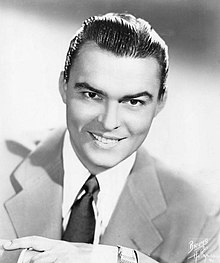Ray Eberle: Difference between revisions
→External links: add category using AWB |
|||
| Line 23: | Line 23: | ||
Ray Eberle went on to find success with Miller, deeming the songs for ''[[Orchestra Wives]]'', such as the jazz standard "[[At Last]]", to be among his favorites as there were songs he could "sink my teeth into, and make a story out of".<ref>[http://books.google.com/books?id=_Y0yJS0SWdcC&pg=PA144&dq=ray+eberle&as_brr=3&cd=1#v=onepage&q=ray%20eberle&f=false ''Chattanooga Choo Choo: The Life and Times of the World Famous Glenn Miller'' by Richard Grudens, pp. 144-47]</ref> He appeared in the [[Twentieth Century Fox]] movies, ''[[Sun Valley Serenade]]'' (1941) and ''[[Orchestra Wives]]'' (1942). |
Ray Eberle went on to find success with Miller, deeming the songs for ''[[Orchestra Wives]]'', such as the jazz standard "[[At Last]]", to be among his favorites as there were songs he could "sink my teeth into, and make a story out of".<ref>[http://books.google.com/books?id=_Y0yJS0SWdcC&pg=PA144&dq=ray+eberle&as_brr=3&cd=1#v=onepage&q=ray%20eberle&f=false ''Chattanooga Choo Choo: The Life and Times of the World Famous Glenn Miller'' by Richard Grudens, pp. 144-47]</ref> He appeared in the [[Twentieth Century Fox]] movies, ''[[Sun Valley Serenade]]'' (1941) and ''[[Orchestra Wives]]'' (1942). |
||
He made |
He made several [[Universal Studios|Universal]] films, including ''[[Mister Big 1943 film|Mister Big]]'', making a [[cameo appearance|cameo]] appearance as himself. Eberle mostly sang ballads.<ref>[http://books.google.com/books?id=38tE4wwC0u0C&pg=PA101&dq=ray+eberle&as_brr=3&cd=9#v=onepage&q=ray%20eberle&f=false Swing by Scott Yanow, pp. 101-03]</ref> From 1940-43 he did well on [[Billboard (magazine)]]'s "College Poll" for male vocalist.<ref>[http://books.google.com/books?id=H0UEAAAAMBAJ&pg=PA6&dq=ray+eberle&cd=3#v=onepage&q=ray%20eberle&f=false Billboard magazine for April 24, 1948]</ref> |
||
Ray Eberle sang lead on [[Sometime (1939 Glenn Miller song)|"Sometime"]], composed by Glenn Miller in 1939, "[[Polka Dots and Moonbeams]]", "[[At Last]]", a number 9 chart hit on Billboard in 1942, and "[[To You]]", but Miller ran a tight ship and often fired people after one negative incident. Eberle was stuck in traffic one day during a Chicago engagement, and was late for a rehearsal. Miller fired him on the spot, and replaced him in June 1942 with Skip Nelson. After his departure from Miller, Eberle briefly joined [[Gene Krupa]]'s band before launching a solo career.<ref>[http://www.parabrisas.com/d_eberler.php Solid!, ibid.]</ref> He later joined former Miller bandmate [[Tex Beneke]]'s orchestra in 1970 for a national tour, and reformed his own orchestra later in the decade. |
Ray Eberle sang lead on [[Sometime (1939 Glenn Miller song)|"Sometime"]], composed by Glenn Miller in 1939, "[[Polka Dots and Moonbeams]]", "[[At Last]]", a number 9 chart hit on Billboard in 1942, and "[[To You]]", but Miller ran a tight ship and often fired people after one negative incident. Eberle was stuck in traffic one day during a Chicago engagement, and was late for a rehearsal. Miller fired him on the spot, and replaced him in June 1942 with Skip Nelson. After his departure from Miller, Eberle briefly joined [[Gene Krupa]]'s band before launching a solo career.<ref>[http://www.parabrisas.com/d_eberler.php Solid!, ibid.]</ref> He later joined former Miller bandmate [[Tex Beneke]]'s orchestra in 1970 for a national tour, and reformed his own orchestra later in the decade. |
||
Revision as of 04:30, 30 April 2014
Ray Eberle | |
|---|---|
 Eberle in 1960. | |
| Background information | |
| Birth name | Raymond Eberle |
| Born | January 19, 1919 Hoosick Falls, New York, U.S. |
| Died | August 25, 1979 (aged 60) Douglasville, Georgia, U.S. |
| Genres | Big band, swing, Traditional Pop |
| Occupation | singer |
| Instrument | vocals |
| Years active | 1938 - 1979 |
Raymond "Ray" Eberle (born January 19, 1919, Hoosick Falls, New York — died August 25, 1979, Douglasville, Georgia) was a vocalist during the Big Band Era. Eberle sang with the Glenn Miller Orchestra.
Career
He was born in Hoosick Falls, New York. His father, John A. Eberle, was a local policeman, sign-painter, and publican (tavern-keeper). His elder brother was Big Band singer, Bob Eberly, who sang with the Jimmy Dorsey Orchestra. Ray started singing in his teens, with no formal training. In 1938, Glenn Miller, who was looking for a male vocalist for his big band, asked Eberly if he had any siblings at home who could sing. Bob said "yes", and Ray was hired on the spot.[1] Music critics and Miller's musicians were reportedly unhappy with Eberle's vocal style but Miller stuck with him.[2]
Ray Eberle went on to find success with Miller, deeming the songs for Orchestra Wives, such as the jazz standard "At Last", to be among his favorites as there were songs he could "sink my teeth into, and make a story out of".[3] He appeared in the Twentieth Century Fox movies, Sun Valley Serenade (1941) and Orchestra Wives (1942).
He made several Universal films, including Mister Big, making a cameo appearance as himself. Eberle mostly sang ballads.[4] From 1940-43 he did well on Billboard (magazine)'s "College Poll" for male vocalist.[5]
Ray Eberle sang lead on "Sometime", composed by Glenn Miller in 1939, "Polka Dots and Moonbeams", "At Last", a number 9 chart hit on Billboard in 1942, and "To You", but Miller ran a tight ship and often fired people after one negative incident. Eberle was stuck in traffic one day during a Chicago engagement, and was late for a rehearsal. Miller fired him on the spot, and replaced him in June 1942 with Skip Nelson. After his departure from Miller, Eberle briefly joined Gene Krupa's band before launching a solo career.[6] He later joined former Miller bandmate Tex Beneke's orchestra in 1970 for a national tour, and reformed his own orchestra later in the decade.
Death
Ray and his wife, Janet (née Young), had two children. Ray Eberle died of a heart attack in Douglasville, Georgia on August 25, 1979, aged 60.[7]
References
External links
- 1919 births
- 1979 deaths
- Big band singers
- People from Rensselaer County, New York
- American male film actors
- American male singers
- Bell Records artists
- Musicians from New York
- Deaths from myocardial infarction
- Cardiovascular disease deaths in Georgia (U.S. state)
- Apollo Records artists
- 20th-century American male actors
